Aid comes before human rights
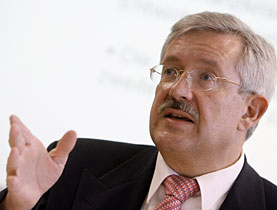
When it comes to providing aid to some of the world's neediest countries, Switzerland does not make human rights observance a precondition.
Martin Dahinden, who has been the director of the Swiss Agency for Development and Cooperation (SDC) for almost a year, tells swissinfo the agency often elects to work in areas where the rule of law is not well respected, such as Darfur.
Dahinden divides the SDC’s long-term philosophy into three levels. The organisation’s broadest objective – to help reduce poverty and alleviate human suffering – is enshrined in the Swiss constitution.
The SDC’s medium-term goals are decided by the government and endorsed by parliament, but Dahinden makes the point that his organisation has “an ethical and not a geopolitical agenda”.
He says each country the SDC operates in has differing needs, and that the workers on the ground use tangible indicators, such as illiteracy and disease reduction or access to drinking water, as a means of measuring how the organisation is performing. He admits the reality is not perfect.
swissinfo: One of the ways the SDC defines development cooperation is supporting, democracy, human rights and the rule of law. In some countries, this isn’t happening.
Martin Dahinden: First of all, it is very important to recognise that rule of law and human rights on one side, and development on the other, are closely interrelated, in all contexts. Be it a fragile context, be it a developing country, or be it in a transition country in eastern Europe.
When designing specific action, you do an analysis and try to find ways to work on this layer in order to have an impact on economic and social development.
We are, however, not establishing some sort of a rating and, according to a country rating in the area of human rights, giving or not giving aid. This type of conditionality does not exist. There might well be contexts with enormous problems in the area of human rights or in the rule of law where we think it is important to be present and to take action to try to change those contexts for the better.
swissinfo: Can you explain this approach and how much tolerance there is for nuance?
M.D.: If you take the respect of human rights as a condition for being present or not, you would probably not have any activities in Darfur. But this is not how we act. We analyse the context and if we are in a position to have a positive impact with our activities we become active.
We help protect people and improve their living conditions. There is no simple paradigm we can follow. The analyses need to be done first and then the consideration about what kinds of changes we can bring with our actions.
swissinfo: You replaced a director who was in the position for quite a long time. How has the organisation changed since the departure of Walter Fust?
M.D.: One should not overestimate the change of the director. The SDC was five or six years ago a very different organisation, dealing with programmes and projects and having to some extent a life of its own. If you look at the real challenges for our partner countries, you will find the SDC much broader.
You will find many challenges that you cannot deal with only in this more traditional way. Climate change, food security, migration, water, energy and so on play an important role. Globalisation – including the current financial and economic crisis – led us to new thinking.
Since January of this year we have a new strategy. The organisation we have is basically one that tries to take up those new challenges.
swissinfo: How does the SDC differentiate itself from other countries?
M.D.: There are some characteristics of Swiss aid from the early times – from the 1950s and 1960s. One element was to work very closely from the beginning at the grassroots level and with civil society. When development cooperation emerged, it was mainly a concept in the Cold War framework. Neutral Switzerland had at that time a development cooperation that was going very much directly to the people. This has remained.
Today it remains extremely important that we expose ourselves to the reality in the developing world and in eastern Europe. I would not like to see the SDC develop into the kind of institution that is mainly a planning industry. Some of our cooperation topics are also different. You will find many projects with a direct link to the Swiss situation. For instance, projects in the areas of decentralisation, providing services to the citizen, and of course the long tradition of humanitarian rights and humanitarian law.
These are the kind of things that I would describe as “Swissness”. “Swissness” means for me not putting the Swiss flag everywhere. It means a unique approach and a special set of topics.
swissinfo: Do developed countries have a moral obligation to give more in addition to a moral obligation to enforce tougher standards?
M.D.: I very much think so. When you’re asking yourself what the motivation for helping people in desperate situations is, you find two answers. One is ethical, a moral obligation. If you are living in a good environment, if you have access to what you need, food, medical care, education etc. you feel obliged to help those who are living in a worse or even desperate situation. This is an ethical issue and we should not leave this ethical issue out of our daily work.
And then there is a second consideration. Not a contradiction but a second answer to the question. If you don’t pay attention to the situation of people in desperate situations, you will be affected yourself rather soon. You will have to deal with illegal migration. People living in a desperate situation are susceptible to fundamentalism; their homes become breeding grounds for terrorism and so on.
We are now living in a world where things happen in remote areas that immediately become relevant to us. So our commitment is both an ethical motivation as well as a very good sense to pursue our own interests.
swissinfo-interview: Justin Häne
Martin Dahinden was born in 1955.
He took over the directorship of the SDC on May 1, 2008 after four years as director of the foreign ministry’s corporate management department.
From 2000-2004, he served as director of the Geneva International Centre for Humanitarian Demining.
Since his entry into diplomatic service in 1987, Dahinden has held positions in Geneva, Paris, Nigeria and New York. He is the former deputy head of the Swiss mission to Nato in Brussels.
Dahinden studied economics at Zurich University. He holds a doctorate.
Swiss development aid makes up 0.4% of gross domestic product – short of the United Nations Millennium Development Goal of 0.7%.
Parliament last year decided in principle to gradually increase aid to 0.5% by 2015.
The SDC has a staff of about 600 people in Switzerland and abroad. It also employs about 1,000 locals and has an annual budget of about SFr1.5 billion ($1.3 billion).
Together with funds from the State Secretariat for Economic Affairs (Seco), official development aid amounted to about SFr2 billion last year.
40% of the funds go towards multilateral aid, including UN agencies.
Last year non-governmental organisations contributed a further SFr500 million.
The SDC has launched the second phase of its reorganisation, aimed at increasing efficiency in relations between headquarters and the cooperation offices in the field.
In a first step, management at the Bern headquarters was reorganised. Around 340 employees were given new job descriptions and about 700 dossiers were examined.
Last year the SDC announced it was reducing the number of priority countries and regions benefiting from assistance from 17 to 12.
The new mandate followed a decision by parliament to make Swiss development aid more efficient.

In compliance with the JTI standards
More: SWI swissinfo.ch certified by the Journalism Trust Initiative
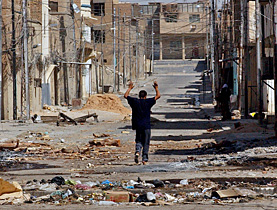
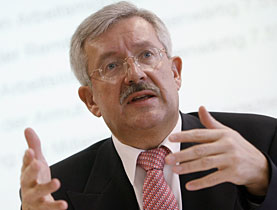
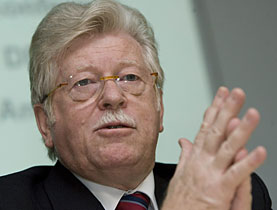
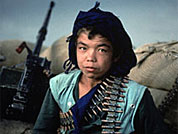

You can find an overview of ongoing debates with our journalists here. Please join us!
If you want to start a conversation about a topic raised in this article or want to report factual errors, email us at english@swissinfo.ch.